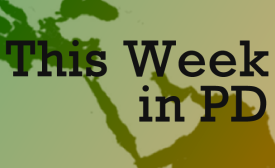social media
The US State Department has launched an experimental unit to fight al-Qaeda ideologists on Twitter across the web. But can it actually stop terrorism?
Since January 2012, Dr Manmohan Singh, the outgoing prime minister of India, has regaled the 1.24 million followers of the prime minister’s official account on Twitter with blurry photographs, links to turgid Press Information Bureau releases, and festive tidings. No more.
Iranian President Hassan Rouhani has said that the cyber world should be regarded as an opportunity and not a threat. The Iranian president said that new communications technologies, such as satellite channels, the internet, and mobile phones, should not be considered a threat to the Islamic beliefs of young people. Rouhani also stated that the era of delivering messages through “one-way tribunes” and “one-way speakers” has come to an end, noting that in the modern world, the more widely messages are circulated, the more effectual they are.

As women circumvent strict censorship rules in Iran, the Qatari government looks to counter reports assailing the country's labor laws prior to the 2022 FIFA World Cup.
Police forces across Australia are acting as their own media organisations: producing video and photos, and engaging with the public via social media. However, with traditional outlets increasingly reliant on multimedia produced by the police, can the public be sure they're getting the full picture?
Every May, Israelis and Palestinians hold warring days of remembrance – one for the day their country was born, the other for the day their nation suffered a nakba, or "catastrophe." But amid all the waving of the Israeli flags this year, an Israeli NGO has launched a smartphone app to commemorate the more than 400 Palestinian villages depopulated or destroyed in the wake of Israel’s founding. iNakba puts those villages back on the map, allowing users to upload photos, videos, stories, and other data to paint a picture of the former landscape.
Internet, its online media sources and numerous digital services have become an essential part of international data exchange as well as a powerful instrument to influence public opinion worldwide. What countries are the most advanced users of the new digital tools? A research project conducted at Tel Aviv University's Department of Communications into the practice of "digital diplomacy" yielded rather unexpected results.
Dozens of women in Iran are flouting state-imposed dress rules with online, often anonymous photographs showing them dropping their headscarf for a moment. In only 10 days, a Facebook page titled “Stealthy Freedoms of Women in Iran” has received more than 100 such photos and 146,000 expressions of support. The page’s organizers say they want to fuel debate on the government-mandated hijab head-covering, which is often enforced by local militias with beatings or detention for women suspected of following loose Western ways.







